
In the realms of Hindu philosophy, the eternal love story of Lord Krishna and his beloved Radha holds a special place. Their divine union symbolizes the eternal bond between the individual soul (Jivatma) and the Supreme Lord (Bhagavan). While Krishna is revered as the Supreme Lord, Radha is revered as his eternal consort, the embodiment of pure devotion and unconditional love. The mystical and enchanting persona of Radha Rani has captivated our hearts. She is revered as the epitome of love, devotion, purity, and spiritual ecstasy. Radha’s unparalleled devotion towards Lord Krishna and her unconditional love for him serve as an inspiration for devotees seeking a deep connection with the divine. It is on the auspicious occasion of Radha Ashtami, the appearance day of Radha Rani, that devotees across the world celebrate her divine presence and offer their adoration to this divine feminine force. Radha Ashtami, also known as Radhashtami or Radha Jayanti, is celebrated on the eighth day of the bright half of the month of Bhadrapada (August/September) in the Hindu calendar. This day marks the anniversary of Radha’s incarnation in this world. Devotees observe this occasion with great enthusiasm and reverence, organizing various rituals, devotional activities, and festive celebrations.
The celebration of Radha Ashtami is a joyous occasion for Vaishnavas, who observe this day with fasting, prayers, devotional songs, and recitations of sacred texts. Temples and homes are adorned with vibrant decorations, and beautifully crafted images of Radha and Krishna are worshiped with great fervor. Devotees engage in melodious kirtans (devotional songs) and ecstatic dance performances, immersing themselves in the divine love of Radha and Krishna. This article delves into the essence of Radha Ashtami, exploring the significance of Radha Rani’s appearance day and its spiritual implications. Let us immerse ourselves in the festivities of Radha Ashtami, as we celebrate the eternal presence of Radha Rani and seek her blessings for a life filled with divine love and spiritual bliss.
Who is Srimati Radharani ?
Sri Krishna, the Supreme Personality of Godhead, encompasses the essence of divine enjoyment and serves as the master of all creation. He is recognized as “Isvara,” the ultimate controller, and the root cause of all causes (sarva karana karanam). Srimati Radharani, on the other hand, represents the embodiment of His Hladini shakti, the internal potency that emanates bliss and spiritual pleasure. Amongst His countless devotees, Sri Radhika stands out as the most extraordinary, holding the position of the most intimate servant of the Supreme Lord.
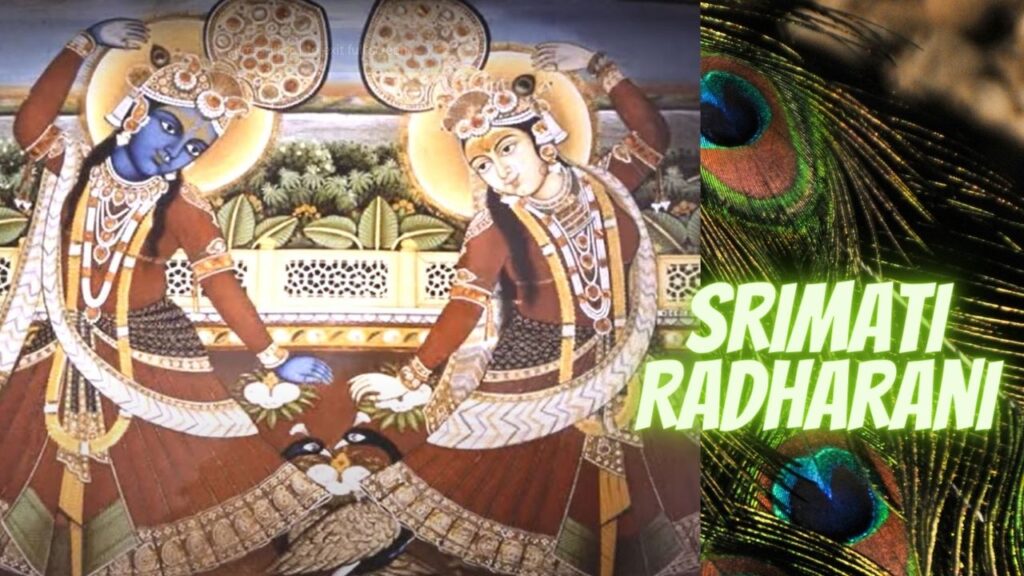
In her pure devotion, Sri Radhika loves and reveres Krishna as an ordinary cowherd boy of Vrindavana, not acknowledging Him as the illustrious king of the Yadus or the majestic Supreme Personality of Godhead. Her heart becomes intoxicated with Krishna’s sweetness (madhurya), leading her to willingly sacrifice anything, even her own existence, in order to please her beloved. Sri Radhika’s love for Krishna transcends conventional logic, surpasses the boundaries of sacrifice, and delves into the depths of emotional turbulence.
Sri Krishna serves as the life and soul of the Vraja Gopis, the young maidens of Vrindavana. They were well aware that their association with Krishna would lead to rejection by their families and authorities, a consequence far more agonizing than enduring fire or even death. Nevertheless, they disregarded all apprehensions and chose Sri Krishna over their greatest fears. Serving Krishna became the very purpose of their existence. This unparalleled level of attachment, known as ‘Raga,’ and the willingness to sacrifice everything for Krishna epitomize the state of being ‘anuragi,’ a true lover of the Supreme.
The Gopis of Vrindavana epitomize devotional ecstasy itself, yet Srimati Radharani surpasses them all, embodying the pinnacle of devotion known as ‘Mahabhava.’ She encompasses the essence of all devotional qualities and serves as the personification (swarupa) of this exalted state. The Gopis of Vrindavana are expansions of Radhika, and she surpasses them all in her unwavering devotion towards the Lord. Hence, Narada describes her as the ‘Supreme’ (uditam) in the Radha-Mahatmya of Padma Purana, acknowledging her elevated position in the realm of divine love and devotion.
Beauty and Qualities of Radha Rani
Sri Radhika, the epitome of supreme beauty, radiates with a resplendent aura adorned by sixteen exquisite embellishments. Her form is bathed with purity, and a pearl delicately glimmers on the tip of her nose. She drapes herself in vibrant garments, complemented by a gracefully tied waist sash. Her braided hair is adorned with captivating ear ornaments, and her anointed limbs exude an enchanting fragrance. Flowers delicately grace her hair, and garlands gracefully adorn her neck. In her hand, she holds a captivating lotus, while a betel nut graces her lips. A musk dot embellishes her chin, and her captivating eyes are accentuated with mascara. Intricate patterns adorn her cheeks, and lac beautifies her feet. Finally, a tilaka adorns her radiant forehead, completing her divine appearance.
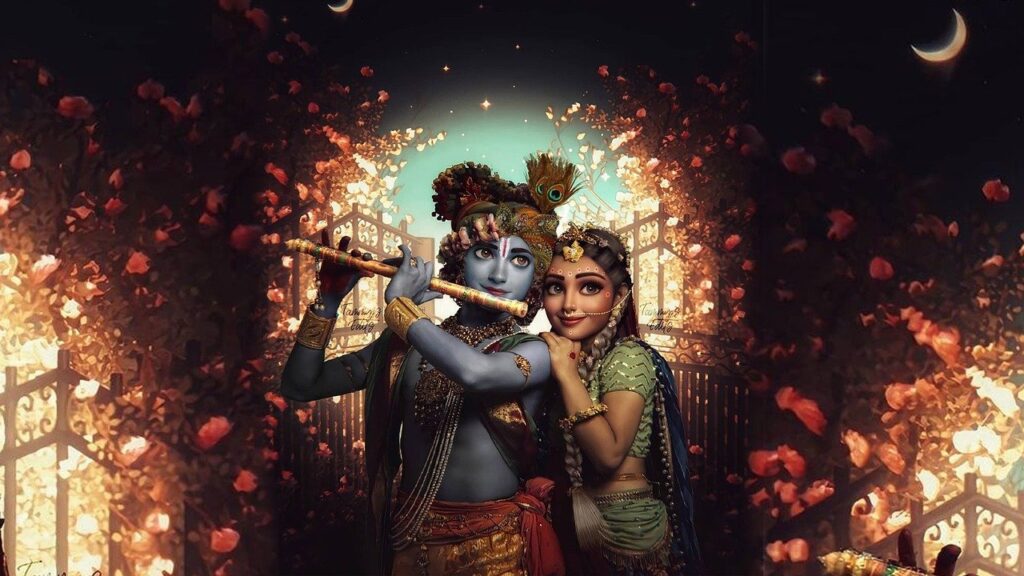
Radiating like the sun, Sri Radhika bedecks herself with twelve captivating ornaments. A luminous crown jewel graces her head, while two golden earrings illuminate her visage. A golden belt encircles her waist, accompanied by a resplendent medallion. Her ear is adorned with two chakri-salakas, exquisite ornaments featuring a wheel design and a pin piercing her earlobe. She wears two bracelets that gleam with elegance, and a throat ornament enhances her beauty. Rings embellish her delicate fingers, and a necklace graces her neck. Star-like armbands adorn her graceful arms, and jewel-studded anklets illuminate her footsteps. Lastly, her dazzling toe rings exude a mesmerizing effulgence.
The beauty of Sri Radhika’s eyes surpasses the splendor of blooming lotus flowers, while the luster of her body outshines even the most precious gold. Endowed with the freshness of youth, her captivating glances flicker like unsteady lightning, and her enchanting smile captivates the celestial birds known as Cakora, who subsist on moonlight. Adorned with auspicious symbols such as a crescent moon, bracelets, flowers, vines, and earrings, she emanates an irresistible charm. Her mesmerizing fragrance ensnares Krishna’s heart, and her melodic voice surpasses the sweetest notes of a cuckoo. She excels in jesting and displays humility, wit, and cleverness. A master of all arts, she demonstrates prowess in mineral painting and culinary skills. She triumphs over Krishna in verbal and dice battles and possesses remarkable skill in stringing garlands, understanding sarees, and conversing with parrots. Her musical intelligence is exceptionally sharp, and her compassion is boundless, as she sheds tears upon witnessing a calf in distress. She embodies shyness, adherence to proper conduct, patience, inscrutability, and coy demeanor. Manifesting an insatiable thirst for Krishna, she represents the pinnacle of devotional ecstasy, known as Mahabhava. The mere sight of her fills the inhabitants of Gokula with boundless affection, and her fame illuminates the entire universe. She is cherished dearly by elders and is held in the highest regard by Krishna’s beloved companions. With her indomitable influence, she continually captivates and controls the heart of Lord Krishna.
Different Tales describing the Birth of Radharani on Radha Ashtami
Srimati Radharani appeared on the auspicious day of Radha ashtami, the eighth day of the bright moon in the month of Bhadra (August-September). She is the eternal daughter of King Vrishabhanu and mother Kirtida. She was born at Raval (near Mathura) and dwelled at this place till the time Krishna lived in Gokul. When Nanda Maharaja shifted his family from Gokul to Nandgaon, Vrishabhanu Maharaja also shifted from Raval to Barsana. Nanda Maharaja and Vrishabhanu Maharaja were close friends. Srimati Radharani is also celebrated as Vrindavaneshwari or the queen of Vrindavan. There are a number of different stories portraying Srimati Radharani’s appearance in this material world. All of them are correct as Radharani had appeared in this world countless times in the course of different millennia. We shall try to recite each of these different stories in this article.
Radharani appears due to Brahma’s boon to Vindhya Parvata
The story of Radharani’s appearance is beautifully depicted by Srila Rupa Goswami in his work called Lalita Madhava. In this tale, Paurnamasi (manifestation of Yogmaya) narrates the story to Gargi, the daughter of Garga Muni, with the guidance of her spiritual master, Narada.
Once, Vindhya Parvata, a mighty mountain, grew envious of the Himalayas because he had Parvati (Gauri) as his daughter and Lord Shiva as his son-in-law. Vindhya desired a daughter who would be even more fortunate and whose husband would surpass even Lord Shiva in strength. To fulfill his wish, Vindhya Parvata undertook intense austerities to please Lord Brahma. Pleased by his devotion, Brahma granted him his desires but became concerned about who could surpass Lord Shiva in battle.
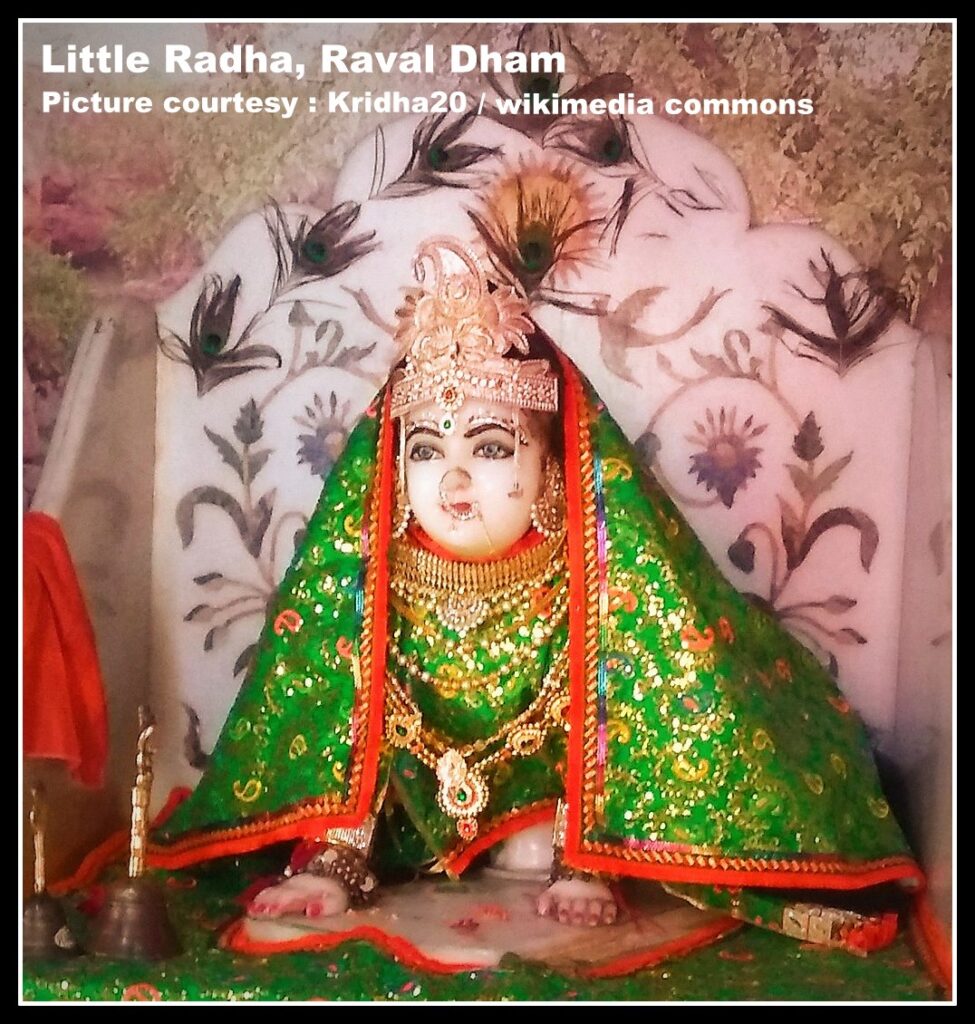
Realizing that Lord Krishna would soon descend to the material world and possess the power to defeat Lord Shiva, Brahma contemplated that Vindhya needed Radharani, Krishna’s eternal consort, as his daughter to secure Krishna as his son-in-law. However, Radharani’s eternal mother was Kirtida. Brahma became anxious, and he fervently prayed to Radharani. When Radharani became pleased with Brahma’s devotion, she agreed to appear as Vindhya’s daughter.
Yogamaya devi, the divine potency of Lord Krishna, orchestrated the transfer of Radharani and another girl named Chandravali, who had already taken birth in the wombs of the wives of Vrishabhanu and his brother Chandrabhanu, to the womb of Vindhya’s wife.
Meanwhile, King Kansa, out of fear that a child who would end his life had been born, ordered Putana, a wicked demoness, to kill young boys and abduct young girls. Upon seeing Radharani and Chandravali, Putana desired to take them away. She snatched the girls and flew away with them. Witnessing this, Vindhya summoned his brahmanas to chant powerful mantras to counter the demoness. As a result, Putana gradually weakened until she could no longer hold onto the baby girls.
Putana threw Chandravali into a river that flowed to the kingdom of Vidarbha, where she was cared for by King Bhismaka until she reached the age of five. Later, Jambavan, a wise king, discovered the girl and returned her to Vindhya. As for Radharani, Putana released her while flying over Vraja. Paurnamasi rescued the baby and entrusted her to Mukhara, informing her that Radha was the daughter of Vrishabhanu, her son-in-law. From that point on, Radha became renowned as the beloved daughter of King Vrishabhanu.
Katyayani devi blesses King Vrishabhanu to have Radharani as his daughter
In ancient times, Surya Deva, the sun god, fervently worshipped Lord Hari, desiring to have the queen of Goloka as his daughter. Pleased by his devotion, the Lord agreed to fulfill his heartfelt wish. Thus, Surya Deva incarnated as Vrishabhanu, the son of King Mahabhanu of Raval. As time passed, Vrishabhanu inherited the throne from his father and married Kirtida, the daughter of Bindu and Mukhara, a wealthy cowherd residing in Vraja.
Despite several years of marriage, Vrishabhanu and Kirtida were unable to conceive a child. They tried various remedies, including performing yajnas, engaging in acts of worship, donating to charity, and embarking on extensive pilgrimages, but their efforts proved futile. Finally, upon Kirtida’s suggestion, Vrishabhanu Maharaja began worshipping Katyayani Devi, the goddess of fertility, with great austerity on the banks of the river Yamuna.
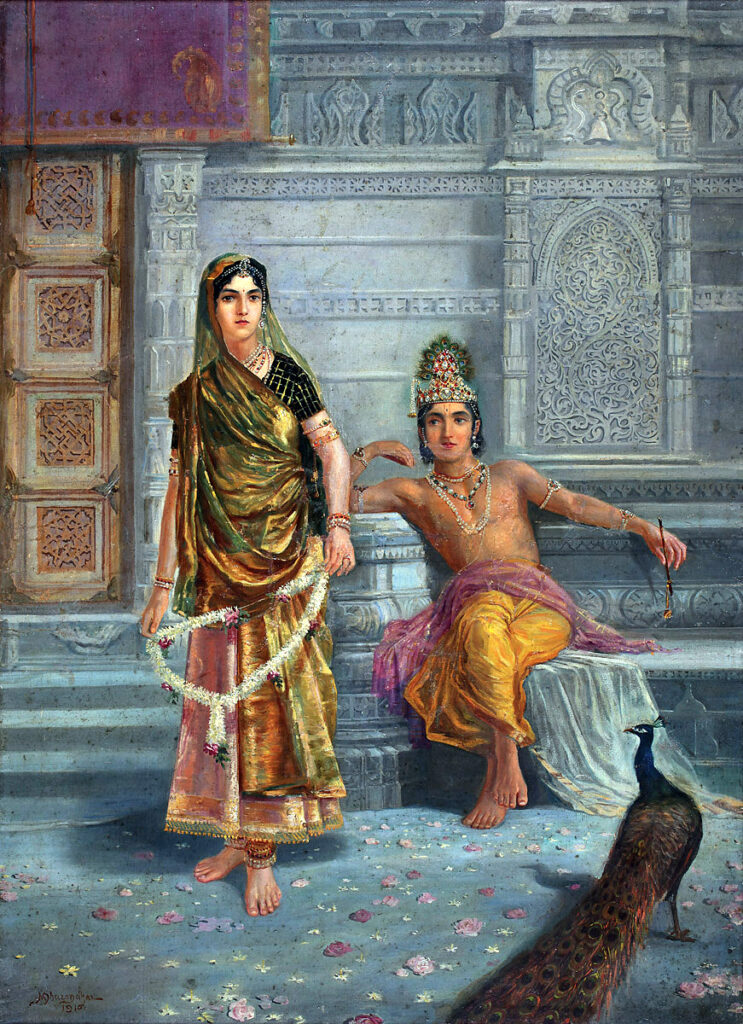
One day, while deeply immersed in meditation, King Vrishabhanu heard a divine voice that urged him to seek refuge in Harinama, the sacred name of Lord Sri Hari. The voice emphasized the purifying nature of the holy name and its profound effect. Inspired, Vrishabhanu sought guidance from the nearby hermitage of sage Kratu. Kratu Muni explained the glorious power of Harinama and instructed the king to regularly chant the Hare Krishna Mahamantra – “Hare Krishna Hare Krishna Krishna Krishna Hare Hare, Hare Rama Hare Rama Rama Rama Hare Hare.”
Kratu Muni further revealed that irrespective of whether one worships Lord Shiva, Vishnu, the sun god, or Ganesha, taking shelter in the holy name is essential. Those unfortunate souls who remain untouched by the divine sound of Sri Hari’s holy names are truly deprived. Kratu Muni affirmed that the chanting of Harinama had been glorified by the great sage Vyasadeva and was also taught by Lord Brahma to Angira Muni.
Following the sage’s instructions, King Vrishabhanu embraced the mantra and began chanting it with unwavering devotion. In due course, goddess Katyayani appeared before Vrishabhanu Maharaja and presented him with a radiant, oval-shaped box. As time passed, the cherished desires of Vrishabhanu Maharaja and Kirtida Devi were fulfilled. On the auspicious day of Radhastami, the most exquisite and golden-complexioned Radharani manifested as their beloved daughter, bringing immeasurable joy and divine grace to their lives.
Radharani appears in a thousand petalled lotus
During a serene meditation session on the banks of the Yamuna, King Vrishabhanu found himself captivated by the enchanting form of the Supreme Lord. Lost in his deep contemplation, he was astounded when a majestic thousand-petalled lotus gently floated towards him. As he opened his eyes, a sight of unparalleled beauty unfolded before him – a resplendent girl, adorned in radiant hues, joyfully frolicking within the blossoming flower.
Overwhelmed with joy and divine providence, King Vrishabhanu gratefully embraced the ethereal girl and carried her to his palace. Little did he know that this exquisite maiden was none other than Radharani, the eternal consort of the Supreme Lord. In this divine manner, Radharani was lovingly reunited with her eternal parents, Vrishabhanu Maharaja and Kirtida Devi, creating an everlasting bond of love and devotion. Their hearts overflowed with boundless happiness and a deep sense of fulfillment as they welcomed their beloved daughter into their lives.
Radharani opens her eyes for the first time
In the wake of Radharani’s divine arrival, the esteemed Paurnamasi graced the abode of Raval and unveiled to Vrishabhanu Maharaja and Kirtida Devi the extraordinary stature of their beloved daughter. With utmost reverence, she revealed that Radha was no ordinary being but the eternal consort of the Supreme Lord Himself. Just as the Lord descends to the material realm by His own sweet will, Radharani had chosen to manifest in this world out of her own sweet will. She was the very source of goddess Lakshmi and held the adoration of deities like Brahma, Shiva, Indra, Varuna, and others.
Radharani’s luminous aura and unparalleled beauty touched the hearts of all who beheld her. However, a sense of melancholy gripped her parents as they believed their precious daughter was born blind, for she had not yet opened her eyes. In the midst of their concern, an auspicious visit took place. Nanda Maharaja and Yashoda, accompanied by little Krishna, graced the abode of Raval. While Yashoda and Kirtida engaged in conversation about baby Radha and her purported blindness, the mischievous Krishna quietly entered the room where Radha lay sleeping.
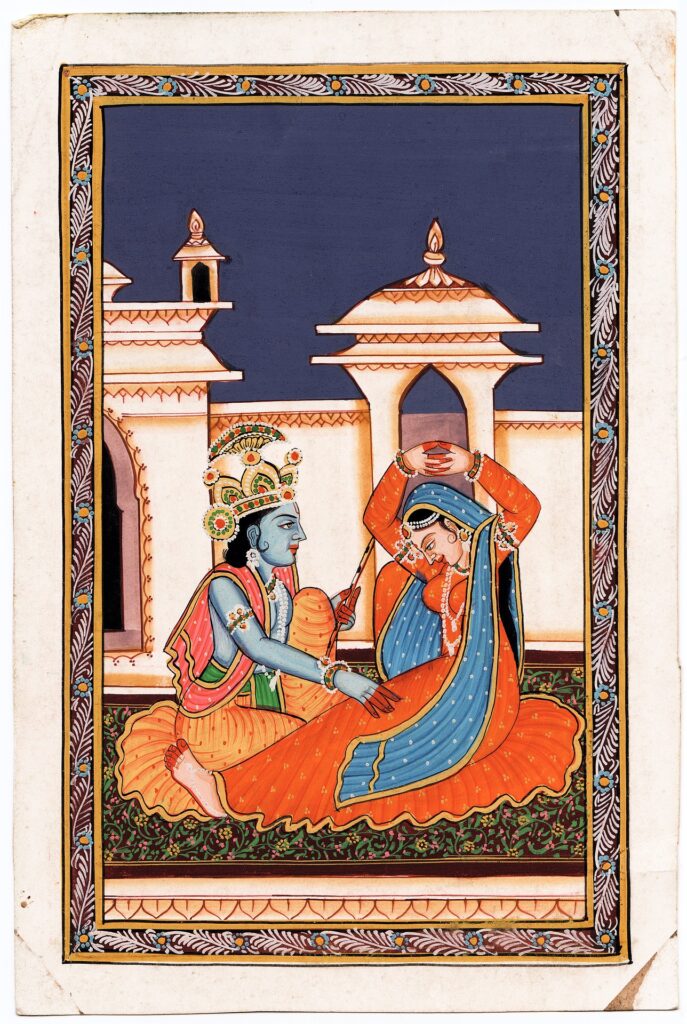
In a tender moment, Krishna approached Radha’s bedside and gently touched her eyes. As if by the touch of divine grace, Radharani opened her eyes, eager to drink in the nectar of Krishna’s captivating beauty. The joyous news quickly spread, and all rejoiced upon learning that Radha had gained the gift of sight.
Prior to the commencement of His earthly pastimes, Krishna had entreated Radharani to accompany Him to the material world. However, being the sovereign queen of Goloka, Radha hesitated, yearning to gaze solely upon Krishna’s enchanting countenance. Assuring her of His presence, Krishna promised that she would always have the privilege of beholding Him. Radharani insisted that the first person she would set her eyes upon in this realm must be Krishna Himself. Moved by her unwavering devotion, Krishna acquiesced to her heartfelt plea and thus, Radha unfurled her eyes solely in the presence of her beloved Mukunda.
Divine Celebrations of Radha Ashtami : Bathing, Adornments, and Glorification
On this sacred and propitious occasion of Radha Ashtami, the divine forms of Sri Radha and Krishna are adorned in splendid new attire, adding to their divine beauty. The altar is adorned with an exquisite arrangement of vibrant and colorful flowers, infusing the air with their delightful fragrance, creating a captivating atmosphere. As the evening approaches, a magnificent abhisheka ceremony takes place to honor the divine couple, Sri Radha Krishna. Devotees joyfully engage in kirtanas, singing enchanting melodies and praising the divine qualities of Srimati Radharani through wonderful songs composed by Vaishnava Acharyas. The Deities are bathed with a divine mixture of milk, curd, ghee, honey, and jaggery-infused water, followed by the pouring of various fruit juices, such as muskmelon, apple, watermelon, pineapple, pomegranate, orange, sweet lime, papaya, grapes, and more. This grand abhisheka ceremony purifies and revitalizes the divine forms of the Deities.
After the abhisheka, a grand aarti is performed, accompanied by the devotees singing verses that glorify the exalted position of Radha Rani. The Deities are then bathed with sanctified water. Following this, a magnificent showering of diverse and fragrant flowers takes place, adding an extra touch of splendor to the celebration. To express their devotion and love, a variety of delectable food delicacies are offered to Sri Radha Krishna, symbolizing the devotees’ desire to please and nourish the divine couple. The celebration reaches its culmination with a grand shayana arati, a special ritual where devotees sing the Radhikastakam, a beautiful song composed by the revered Srila Rupa Gosvami. This devotional song evokes deep sentiments of love and admiration for Srimati Radharani. Radhashtami, therefore, provides a unique and auspicious opportunity to glorify Srimati Radharani, whose divine care and guidance enable individuals to attain perfection in their devotional service to the Supreme Lord.